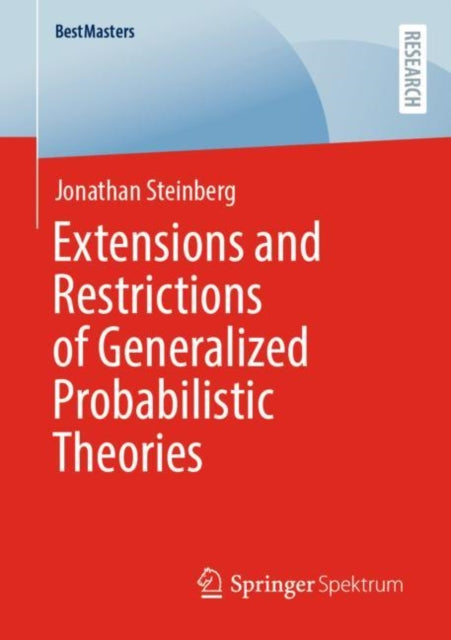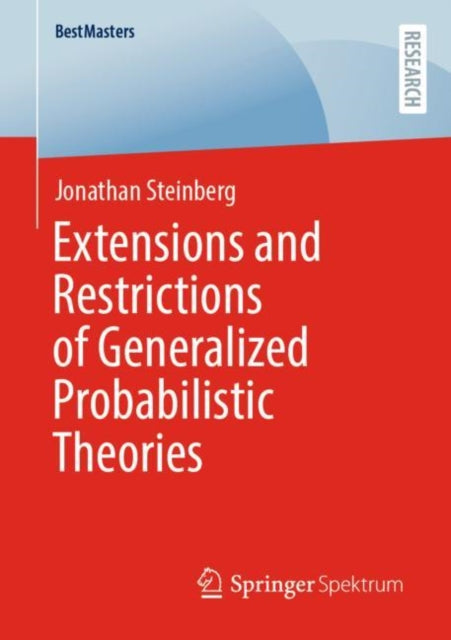Jonathan Steinberg
Extensions and Restrictions of Generalized Probabilistic Theories
Extensions and Restrictions of Generalized Probabilistic Theories
Earn [points_amount] when you buy this item.
YOU SAVE £7.09
- Condition: Brand new
- UK Delivery times: Usually arrives within 2 - 3 working days
- UK Shipping: Fee starts at £2.39. Subject to product weight & dimension
Bulk ordering. Want 15 or more copies? Get a personalised quote and bigger discounts. Learn more about bulk orders.
Couldn't load pickup availability
- More about Extensions and Restrictions of Generalized Probabilistic Theories
Generalized probabilistic theories (GPTs) provide a mathematical framework for quantum theory in an operational language, but they do not directly incorporate the notion of subsystems. Sections are a generalization of subsystems that describe situations where not all possible observables can be implemented. Jonathan Steinberg discusses the mathematical foundations of GPTs using Archimedean order unit spaces and investigates the algebraic nature of sections, including their category theoretic structure and transformation properties. He shows how the tensor product can be interpreted as a special type of section and applies this concept to quantum theory, comparing it with the algebraic approach. Steinberg also gives a complete characterization of low-dimensional sections of arbitrary quantum systems using the theory of matrix pencils.
Format: Paperback / softback
Length: 79 pages
Publication date: 17 May 2022
Publisher: Springer Fachmedien Wiesbaden
Generalized probabilistic theories (GPTs) are a powerful tool that allows us to write quantum theory in a purely operational language, enabling us to formulate a wide range of different theories. However, one challenge that arises is the integration of the notion of subsystems within the framework of convex operational theories. While sections can be seen as a generalization of subsystems, they describe situations where not all possible observables can be implemented.
Jonathan Steinberg delves into the mathematical foundations of GPTs by utilizing the language of Archimedean order unit spaces. He investigates the algebraic nature of sections, including an analysis of the category theoretic structure and the transformation properties of the state space. Steinberg demonstrates how the Hilbert space formulation of quantum mechanics uses tensor products to describe subsystems, and he shows how one can interpret the tensor product as a special type of a section.
Furthermore, Steinberg applies this concept to quantum theory and compares it with the formulation in the algebraic approach. He then provides a complete characterization of low-dimensional sections of arbitrary quantum systems using the theory of matrix pencils.
In conclusion, GPTs offer a powerful framework for writing quantum theory in a purely operational language, and by investigating the algebraic nature of sections, we can gain a deeper understanding of the mathematical foundations of these theories. Steinberg's work provides valuable insights into the integration of subsystems within convex operational theories and the characterization of low-dimensional sections of arbitrary quantum systems.
Weight: 131g
Dimension: 210 x 148 (mm)
ISBN-13: 9783658375805
Edition number: 1st ed. 2022
This item can be found in:
UK and International shipping information
UK and International shipping information
UK Delivery and returns information:
- Delivery within 2 - 3 days when ordering in the UK.
- Shipping fee for UK customers from £2.39. Fully tracked shipping service available.
- Returns policy: Return within 30 days of receipt for full refund.
International deliveries:
Shulph Ink now ships to Australia, Belgium, Canada, France, Germany, Ireland, Italy, India, Luxembourg Saudi Arabia, Singapore, Spain, Netherlands, New Zealand, United Arab Emirates, United States of America.
- Delivery times: within 5 - 10 days for international orders.
- Shipping fee: charges vary for overseas orders. Only tracked services are available for most international orders. Some countries have untracked shipping options.
- Customs charges: If ordering to addresses outside the United Kingdom, you may or may not incur additional customs and duties fees during local delivery.


 Excellent
Excellent